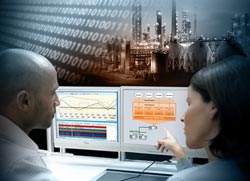Update for Simatic WinCC Version 7 supports client virtualization

The virtualization of clients is one of the central innovations of the Service Pack 2 offered by the Siemens Industry Automation Division for Simatic WinCC Version 7. Virtualization allows several systems that would otherwise require separate hardware to be operated in parallel on one PC.
The virtual WinCC clients can be connected with thin clients via an Ethernet network using RDP (Remote Desktop Protocol). Thin clients are rugged hardware terminals with a display. Thanks to their reduced equipment, they are significantly smaller, more cost-effective and less fault-prone in especially harsh environments than full industrial PCs. In production plants, thin clients provide users with visualization and data input facilities for the virtual WinCC clients installed on a server located away from the field level.
Virtualization technology has three central advantages: On one hand, existing hardware resources are optimally utilized, reducing procurement and operating costs. Companies can significantly reduce their hardware costs in the production environment, particularly in combination with rugged thin clients. On the other hand, virtual clients can be easily and quickly backed up to increase availability. The third advantage is the simple migration of existing, completely configured systems to new hardware, making lengthy installations on the PC unnecessary. After installing Service Pack 2, several WinCC clients can be installed and operated on one hardware platform via the two virtualization applications Microsoft Hyper-V and VMware ESXi 4.0, depending on the hardware equipment of the server. With VMware ESXi 4.0, the user can operate up to eight virtual clients with one PC in a configuration with 16GB RAM, depending on the scope of the project.
Another new feature of the Service Pack 2 is the “Mitsubishi Ethernet” driver with two additional channel units for integrating controllers of the FX3U series and the Q series of Mitsubishi via Ethernet networks. Communication with the controllers takes place via the MELSEC communication protocol (MC protocol). WinCC V7 can also be operated under Windows 7 and Windows 2008 Server following the installation of Service Pack 2. Further innovations such as the addition of more graphics cards to the Split Screen Manager (Multi-VGA), or access to the User Account Control (UAC) safety concept on Windows7, complete the comprehensive Service Pack 2.
The Siemens Industry Sector (Erlangen, Germany) is the worldwide leading supplier of environmentally friendly production, transportation, building and lighting technologies. With integrated automation technologies and comprehensive industry-specific solutions, Siemens increases the productivity, efficiency and flexibility of its customers in the fields of industry and infrastructure. The Sector consists of six divisions: Building Technologies, Drive Technologies, Industry Automation, Industry Solutions, Mobility and Osram. With around 204,000 employees worldwide (September 30), Siemens Industry achieved in fiscal year 2010 total sales of approximately €34.9 billion. http://www.siemens.com/industry
The Siemens Industry Automation Division (Nuremberg, Germany) is a worldwide leader in the fields of automation systems, industrial controls and industrial software. Its portfolio ranges from standard products for the manufacturing and process industries to solutions for whole industrial sectors that encompass the automation of entire automobile production facilities and chemical plants. As a leading software supplier, Industry Automation optimizes the entire value added chain of manufacturers – from product design and development to production, sales and a wide range of maintenance services. With around 33,000 employees worldwide (September 30), Siemens Industry Automation achieved sales of €6.2 billion in fiscal year 2010. http://www.siemens.com/industryautomation
Reference Number: IIA2011012609e
Media Contact
More Information:
http://www.siemens.de/simatic-winccAll latest news from the category: Machine Engineering
Machine engineering is one of Germany’s key industries. The importance of this segment has led to the creation of new university degree programs in fields such as production and logistics, process engineering, vehicle/automotive engineering, production engineering and aerospace engineering among others.
innovations-report offers informative reports and articles covering technologies such as automation, motion, power train, energy, conveyor, plastics, lightweight construction, logistics/warehousing, measurement systems, machine tools and control engineering.
Newest articles

Innovative 3D printed scaffolds offer new hope for bone healing
Researchers at the Institute for Bioengineering of Catalonia have developed novel 3D printed PLA-CaP scaffolds that promote blood vessel formation, ensuring better healing and regeneration of bone tissue. Bone is…

The surprising role of gut infection in Alzheimer’s disease
ASU- and Banner Alzheimer’s Institute-led study implicates link between a common virus and the disease, which travels from the gut to the brain and may be a target for antiviral…

Molecular gardening: New enzymes discovered for protein modification pruning
How deubiquitinases USP53 and USP54 cleave long polyubiquitin chains and how the former is linked to liver disease in children. Deubiquitinases (DUBs) are enzymes used by cells to trim protein…



